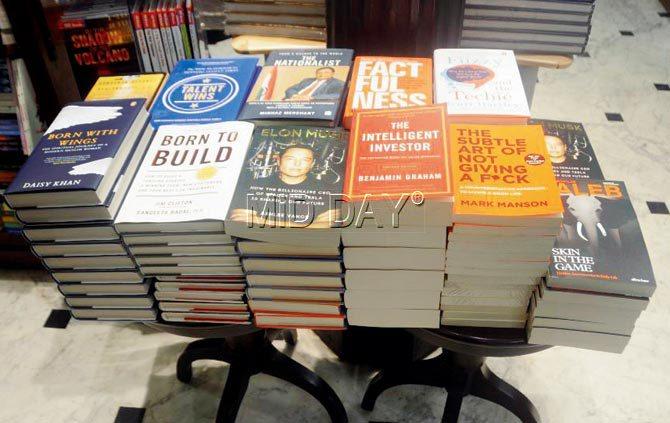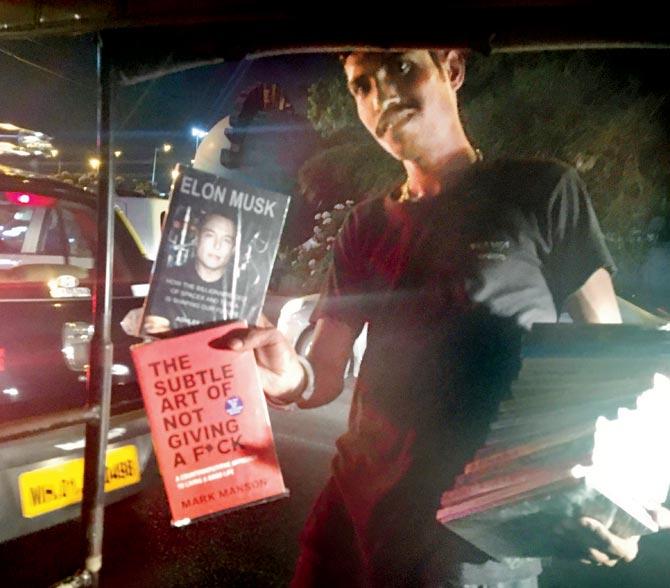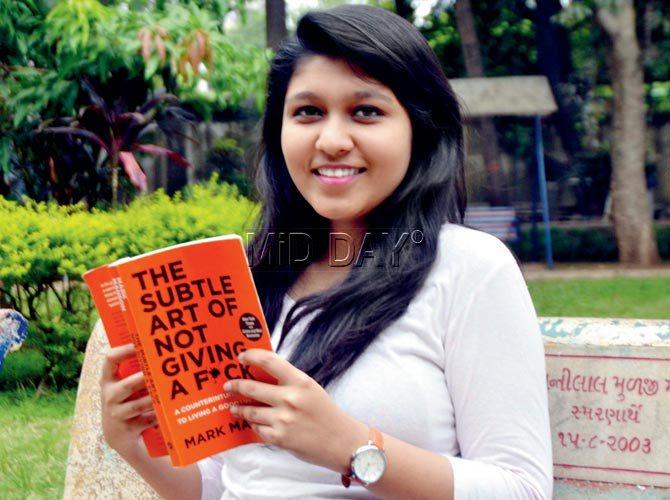Everyone from Alia Bhatt to the stranger in the train is reading The Subtle Art of Not Giving a F*ck. A look at what this means in a genre defined by Stephen Covey and Shiv Khera


Anandita De, 29, with the bestseller at her home. Pic/Bipinâu00c2u0080u00c2u0088Kokate
ADVERTISEMENT
There is no doubt that Mark Manson is now a phenomenon in urban India. It is highly likely that in your circle, there is currently at least one person reading Manson's The Subtle Art Of Not Giving A F*ck, and is not-so-subtly Instagramming or tweeting about it. Manson is a New York-based celebrity blogger, popular for decoding life's most perplexing questions in a manner that would offend polite sensibilities. You may have read one of his most viral blog posts, titled F*ck Yes or No — advice meant to help you get out of grey romantic areas that feel like hit-and-runs.

A part of the self-help section at Kitab Khana, Fort. Manson's book sells well here, as does Ashlee Vance's Elon Musk. Pic/Snehaâu00c2u0080u00c2u0088Kharabe
His second book, The Subtle Art of Not Giving A F*ck, published in 2016, is a New York Times bestseller, and currently the top-selling self-help book for publisher HarperCollins India. It has sold over two lakh copies in the country since it launched in January 2017, and its success surely follows the cover's loud orange and the title's profanity. You just cannot miss it. However, its readership also, arguably, depends on its subtitle — A Counterintuitive Approach to Living a Good Life. Manson's key counterintuitive tips can be summarised as such: Don't think you are unique. Don't think you are entitled to happiness. And, most importantly, save your f**ks for what really matters. What's observable in urban India is that being a highly effective person, winning friends and influencing people, or pushing your boundaries to top your batch — the usual themes of self-help are not the norm anymore. The new "good life" means accepting your imperfections, negativity and vulnerabilities. And it is coming from not just self-help books and bloggers, but also Instagram series and Twitter accounts. Here, #selfcare is the new self-help, where rather than attain goals of perfection, you look for optimum performance, and prioritise your physical, emotional and mental wellbeing above all else.

If your vehicle is stationary in Mumbai's infamous traffic snarls, be ready for hawkers who will show you these top-selling titles, Manson and Elon Musk
The gift of moving on
Rahul Dixit, director of sales, HarperCollins India, observes that there have been shifts in the self-help genre, from books on spirituality, like those by Osho, to business and personality development books by Shiv Khera and Robin Sharma. "Presently, one can see a spike in books like Manson's and Lily Singh's How To Be A Bawse: A Guide to Conquering Life, which are honest and provide a much-needed reality check. This genre is a reflection of the changing backdrop of social and emotional needs," he says. Cuffe Parade-based Anandita De, 29, a lifestyle and fitness blogger, on picking up her copy of Manson's bestseller last week, says, "This book has become a real sensation. Its title sounds like a simple solution." She tells us that the book has been on actors Alia Bhatt's and Shraddha Kapoor's reading lists. De points out that the book has its problems. The first couple of chapters are preachy. "But, it gets you to focus not on happiness but on problems in a realistic way, rather than believing in unicorns and butterflies. Your basic relationships at home, doing your laundry, maintaining your house — all these are as important as cracking a multi-billion dollar deal. That's reality," she adds.

Parita Bhansali. Pic/Datta Kumbhar
Ghatkopar resident Parita Bhansali, 25, turned to Manson after facing a career roadblock. While Bhansali was pretty much content with her job in B2B sales for pharma companies, she didn't find herself growing professionally. A friend recommended the book to her, and the boldness of the title got her to read it. "You have to understand which worry is worth a sleepless night, and which is not. Don't sweat the small stuff, such as the vacation photos that flood our timelines on social media," she tells us. She jokes that she used to be the woman whose self-image depended on new clothes, but now, she hasn't shopped in over a year. Manson often blogs about the hyper-positivity of 'the self-help industry' and the unrealistic expectations it breeds. A blog post, What's the point of self-improvement anyway? states: Self-improvement is… in a weird way, ultimately self-defeating. However, there is no escaping the fact that in publishing, his book is slotted in the self-help or advice category.

Ali Thaver
Mindfulness on screen
Social media, too, is responsible for depressive exaggerated ideas of success. We all know FOMO and YOLO only too well. But, can social media also be a source of the counter-trend that eases this pressure? Take Twitter, for instance, where tweet-spats and heated exchanges have had real life consequences. In this blood-thirsty arena, Ali Thaver, 24, a video editor at a Thane-based production house, found that @dailyzen and @mindfuleveryday are like "gasps of oxygen through your day". "As you scroll down your notifications, you come across their quotes on mindfulness and meditation, collected from spiritual teachers and writers, such as Eckhart Tolle. Though just a few words, these tweets are like signboards and traffic signals during a stressful day," he says. "The basic premise of many of these tweets is that you are not your emotions. When you read these on a daily basis, it helps change your perspective in the long run," he says.

Ali Thaver, 24, gets his self-help on Twitter from @dailyzen and @mindfuleveryday
Instagram accounts, such as @makedaisychains and @thegoodadvicecupcake, follow the same method. They inject your scroll-time with a message or a quote on subjects ranging from body positivity to depression. Many do not even start out as self-help, but find followers looking to navigate life's zany patches. For Reetika Revathy Subramanian, 27, a journalist and development researcher, Anjali Pinto's Instagram series helped her cope with loss. Pinto's eponymous account chronicles her grief after she lost her husband, Jacob, in December 2016. A photographer, Pinto posts photos of her life with Jacob, and what it means to carry on without him. For Subramanian, here was a kindred voice that spoke to her after she lost her grandfather last year. "I didn't know I was vulnerable until then," she says. Her friends helped with suggestions to cope. "They'd say don't be hard on yourself or travel for a bit. They were looking out for me, but it was as if I needed to reach an ideal state, rather than go through my individual journey," she says. Pinto's series, she says, is not about personal transformation, and neither is it asking for the viewer's sympathy.
Mumbai stands apart
Over at Kitab Khana, the bookstore in Fort, a section titled Management couches many self-help titles. Here, titles on leadership skills sit side-by-side with those on mindfulness. The CEO Jagath Tekkate says that Manson is a bestseller, but so is Ashlee Vance's book on Elon Musk, the entrepreneur who founded Tesla and SpaceX. New approaches to life, however, don't mean that the old ones are obsolete, says Tekkate. The 7 Habits of Highly Effective People, first published in 1989, still has takers in Mumbai, he says. As does Dale Carnegie's How To Win Friends and Influence People (1936), which has several local reprints. Publisher Bloomsbury India tells us that their three top-selling titles are Shiv Khera's You Can Achieve More, You Can Win, and You Can Sell. Success, in its conventional terms of money, position and fame, are still key goals for a large part of India, within the 18-35 bracket, says Yogesh Sharma, Senior VP for Sales and Marketing, Bloomsbury India.
"While a shift [in life approaches] may be seen in urban India, in tier 2 and tier 3 cities, there are young people to whom Shiv Khera talks about long-term success and winning. It may be different in cities such as Mumbai, where, even if there is no job security, there is employment security," he says. Social commentator Santosh Desai's thoughts on the subject echo Sharma's. He says that there is a section of young people in India that does not buy into old ideas of careers and life — that you need to have a single-minded focus, you defer gratification, and there will be a day in the future when you enjoy the fruits of your labour. "I think there is a greater sense that different components of your life are important, and that life need not be a steady grind that reaches a pinnacle. But, there is another section that faces unemployment, and for whom the old rules apply," he says. And, then, there will be those that argue that Manson's popularity is on the highly-Instagrammable title and cover, giving millennials and GenZs a new, visible measure of cool. As the new "Just Do It", is Manson's book another means for social validation? While it may help young Mumbaikars get away from the chatter online, its title itself is noisy, Desai observes. "It's screaming for attention. For a book that tells you not to give a f**k, it surely gave a f**k about being read," he says.
 Subscribe today by clicking the link and stay updated with the latest news!" Click here!
Subscribe today by clicking the link and stay updated with the latest news!" Click here!






